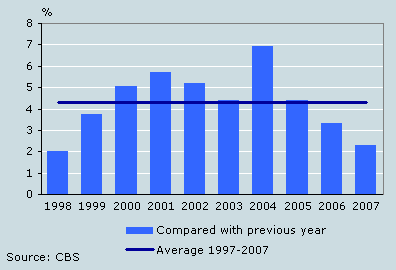Smallest increase in water board levies since 1999

Dutch water boards have budgeted 2.1 billion euro in revenues from levies in 2007. This is 2.3 percent more than in 2006, and the smallest increase since 1999.
Increases in water board levies

In 2007 the water boards will withdraw 73 million net from their reserves. This is three times the amount withdrawn last year. As a result, they can levy lower taxes.
Water boards levy two types of taxes to pay for their activities: land drainage rates and the anti-pollution levy.
Smallest rise for land drainage rates
The land drainage rates are intended to cover the costs incurred by water boards to protect the country from flooding. In 2007 the total revenue from these levies is expected to be 0.8 billion euro, an increase of 1.8 percent on 2006.
The rates for residents and owners of buildings will rise by 2.7 percent in 2007. The revenues from undeveloped land, paid by land owners will be 1.8 percent lower. This shift in the distribution of the rates is in line with the developments in the last ten years.
Anti-pollution levy
Unlike the last three years, in 2007 most of the increase in the water board taxes will be accounted for by the anti-pollution levy. These revenues will cover the costs for maintaining and improving the quality of the surface water. Households, trade and industry pay the levy on the basis of the number of effluent units discharged.
The revenues from the ant-pollution levy will rise by 2.7 percent to nearly 1.3 billion euro. For households the increase is 4 percent compared with 2006. This is the result of an increase in the level of the levy, and an increase in the number of households paying the levy.
Water board tax revenues

Lower revenues from anti-pollution levies paid by companies
Anti-pollution levies paid by companies show a small decrease (0.6 percent) in 2007. In the last ten years companies have been paying a smaller and smaller share of the total anti-pollution levies. In 1997, 34 percent of the amount was paid by companies, in 2007 this is only 28 percent. One reason for this is that companies are discharging less and less effluent because of better provisions. This means the water boards recover a smaller part of the costs from companies.
Elena van Kampen and Dick Zeldenrust